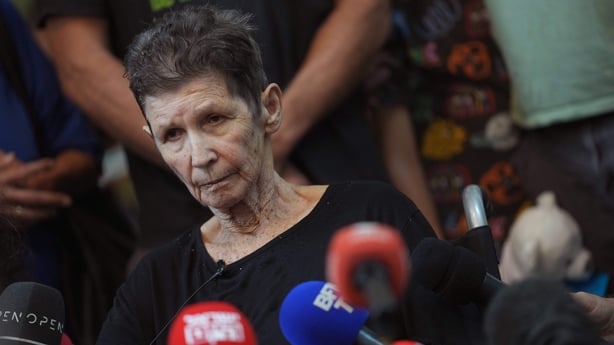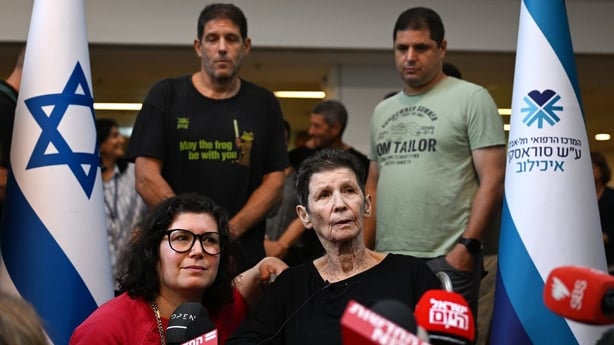An elderly Israeli hostage who was released by Hamas overnight told reporters outside a hospital in Tel Aviv that she "went through hell," during the attack, but was treated well in Gaza.
Yocheved Lifshitz, 85, said she was beaten by militants as she was taken into Gaza on 7 October, but was then well-treated during her two-week captivity in the Palestinian enclave.
She was one of two women freed last night, leaving around 220 hostages still in the hands of Hamas.
Seated in a wheelchair, a frail looking Ms Lifshitz told reporters that a doctor had visited her while she was held in a network of tunnels within Gaza and that all her needs had been taken care of.
"I went through hell, I didn't think or know I'd get to this situation. They went on a rampage in our kibbutz (Nir Oz), kidnapped me, lay me over a motorcycle ... and sped off with me through the ploughed fields," she said.
Her husband, also in his 80s, is still being held in Gaza.
"When I was on the bike, my head was on one side and the rest of my body on the other side. The young men hit me on the way. They didn't break my ribs but it was painful and I had difficulty breathing."
Once in Gaza, she said her captors took her into tunnels that she compared to a spider's web, and treated her well.
Ms Lifshitz said a doctor had visited her and made sure she and other hostages received the same sort of medicines they had been taking in Israel.

She said the Israeli military had not taken the threat of Hamas seriously enough, and that the costly security fence meant to keep militants out "didn't help at all".
"They treated us gently, and provided all our needs," she said, when asked why she reached out to shake the hand of a militant the moment she was freed.
Ms Lifshitz described her captives as "very friendly" and "very courteous" people who had organised well in advance for taking hostages.
"They seemed ready for this, they prepared for a long time, they had everything that men and women needed, including shampoo," she told journalists.
"We ate the same food they did - pitas with cream cheese, melted cheese, cucumbers. That was a meal for an entire day," said Ms Lifshitz.
She was released alongside fellow Nir Oz resident Nurit Cooper, 79, three days after an American woman and her daughter were freed.
Translating for her mother, her daughter Sharone Lifschitz told a press conference in Tel Aviv: "She was taken on the back of a motorbike, with her legs on one side and her head on the other side.
"That she was taken through the ploughed fields with the men in front, on one side, and a man behind her. And while she was being taken she was hit by sticks.
"Until they reached the tunnels. There they walked for a few kilometres on the wet ground.
"There is a huge network of tunnels underneath - it looks like a spider web."

Speaking earlier, Sharone Lifschitz, who is based in London, said her mother "seems OK" after her ordeal.
As she was being released by Hamas militants, the elder Ms Lifshitz was seen reaching back to shake one of their hands as she was handed over to Red Cross officials.
Sharone Lifschitz, an artist and academic who spells her name differently from her mother, said it was "incredible" to be reunited with her - "to hold her hand and to kiss her cheek".
"She is very sharp and is very keen to share the information, pass on the information to families of other hostages she was with," she told the BBC.
She said she will continue to campaign for the release of her father, Oded Lifschitz, and the other captives.
"I hope he is being looked after and has the chance to talk," Sharone Lifschitz said.
"He speaks good Arabic, so he can communicate very well with the people there.
"He knows many people in Gaza and the West Bank. I want to think that he's going to be OK.
"My mum said they had been looked after and there was a doctor there, so this gives a lot of comfort to everybody.
"We have so many people that we've lost - it is a little ray of light but there is a huge darkness as well."
We need your consent to load this rte-player contentWe use rte-player to manage extra content that can set cookies on your device and collect data about your activity. Please review their details and accept them to load the content.Manage Preferences
Ms Lifschitz said she and her mother still dream of peace with the Palestinians, even as an expected ground invasion of Gaza by Israel threatens sparking a wider war in the region.
"We have to find ways because there is no alternative. If anything, it makes me even more resolved," she said.
"The way has got longer - we are dealing with grief and loss on a level we can never get over, but as nations we will have to find a way forward."
Additional reporting PA

